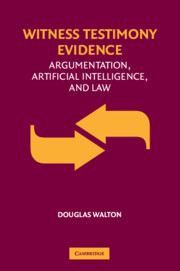Book contents
- Frontmatter
- Contents
- List of Figures and Tables
- Acknowledgments
- Introduction
- 1 Witness Testimony as Argumentation
- 2 Plausible Reasoning in Legal Argumentation
- 3 Scripts, Stories, and Anchored Narratives
- 4 Computational Dialectics
- 5 Witness Examination as Peirastic Dialogue
- 6 Applying Dialectical Models to the Trial
- 7 Supporting and Attacking Witness Testimony
- Bibliography
- Index
1 - Witness Testimony as Argumentation
Published online by Cambridge University Press: 03 February 2010
- Frontmatter
- Contents
- List of Figures and Tables
- Acknowledgments
- Introduction
- 1 Witness Testimony as Argumentation
- 2 Plausible Reasoning in Legal Argumentation
- 3 Scripts, Stories, and Anchored Narratives
- 4 Computational Dialectics
- 5 Witness Examination as Peirastic Dialogue
- 6 Applying Dialectical Models to the Trial
- 7 Supporting and Attacking Witness Testimony
- Bibliography
- Index
Summary
There is a long tradition in philosophy, going back to Plato, of contempt for arguments based on witness testimony as being unreliable, subjective, misleading, and impossible to evaluate as evidence by objective standards. Any argument as fallible as one based on witness testimony is easily seen as subjective in nature, and simply beyond the range of any exact, objective treatment. Certainly the recent findings of social scientists (Loftus, 1979) have given us plenty of grounds for distrust of this fallible form of evidence. In this chapter, some notorious cases of lying witnesses and wrongful convictions based on false or inaccurate witness testimony dramatically illustrate the point. On the other hand, even in an age where video evidence seems to be usurping the place of eyewitness testimony, we could scarcely do without witness testimony as an important kind of evidence in trials and investigations. Thus it is a kind of evidence that is on a razor's edge. We need it, but it can go badly wrong. Thus it is important to study how it should be evaluated as a kind of evidence that can be strong in some cases and weak, or even erroneous and misleading, in others. Chapter 1 begins this process by stating and identifying the premises that witness testimony is based on as a type of argumentation, the conclusions that it leads to, the nature of the inferential link that joins them, and how it can be supported or rebutted.
- Type
- Chapter
- Information
- Witness Testimony EvidenceArgumentation and the Law, pp. 12 - 61Publisher: Cambridge University PressPrint publication year: 2007



